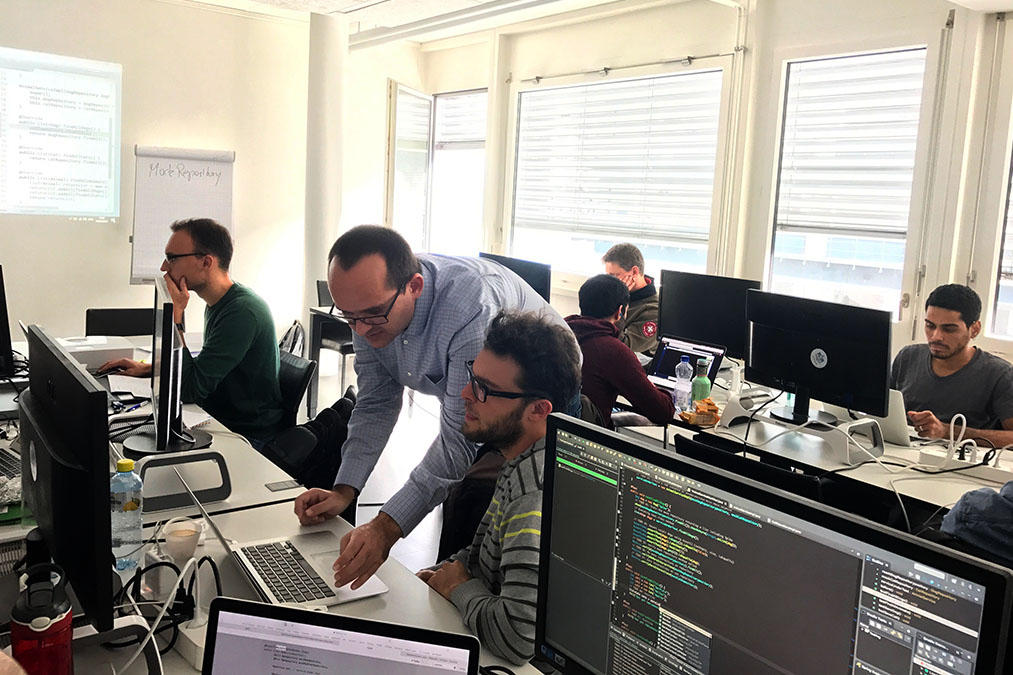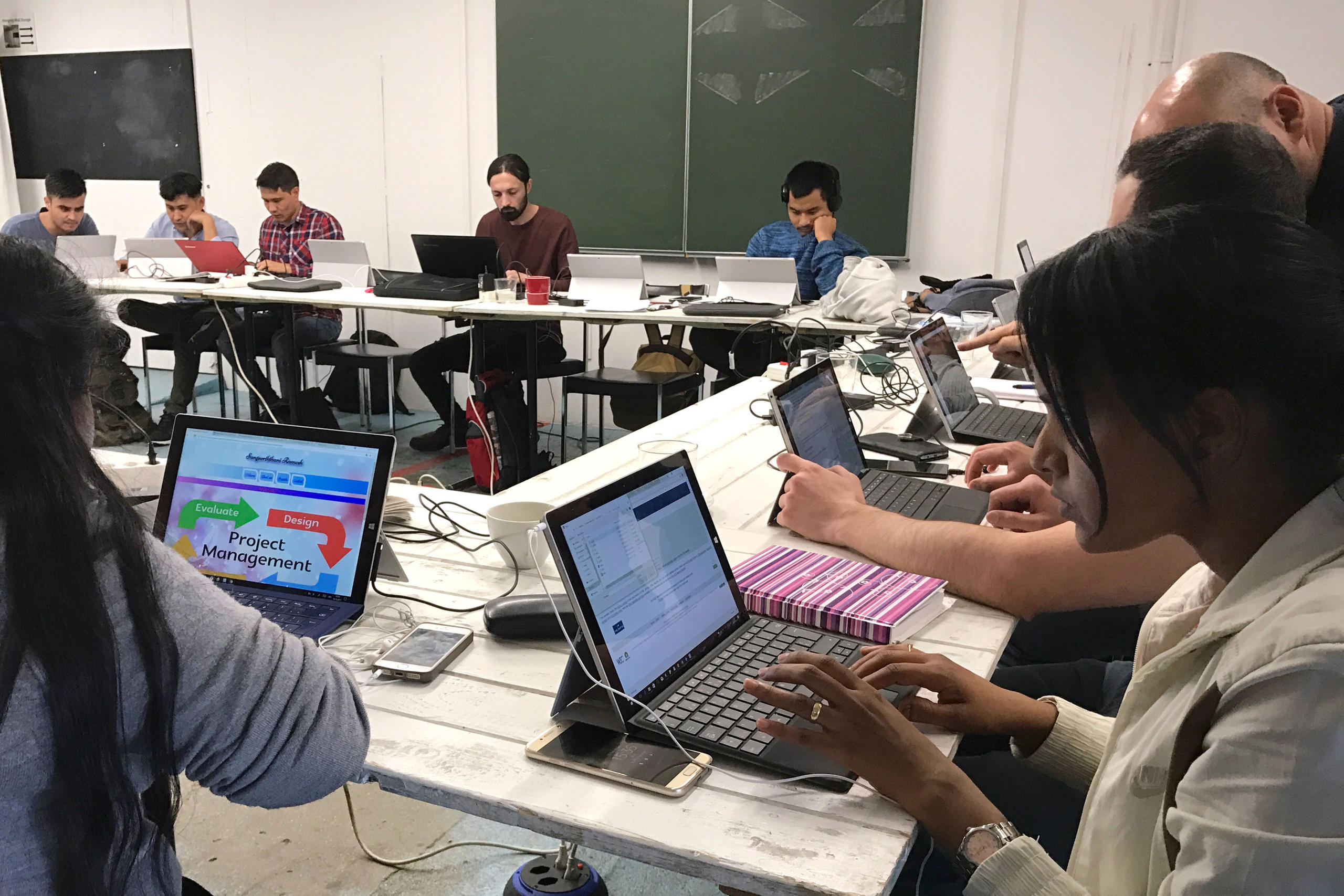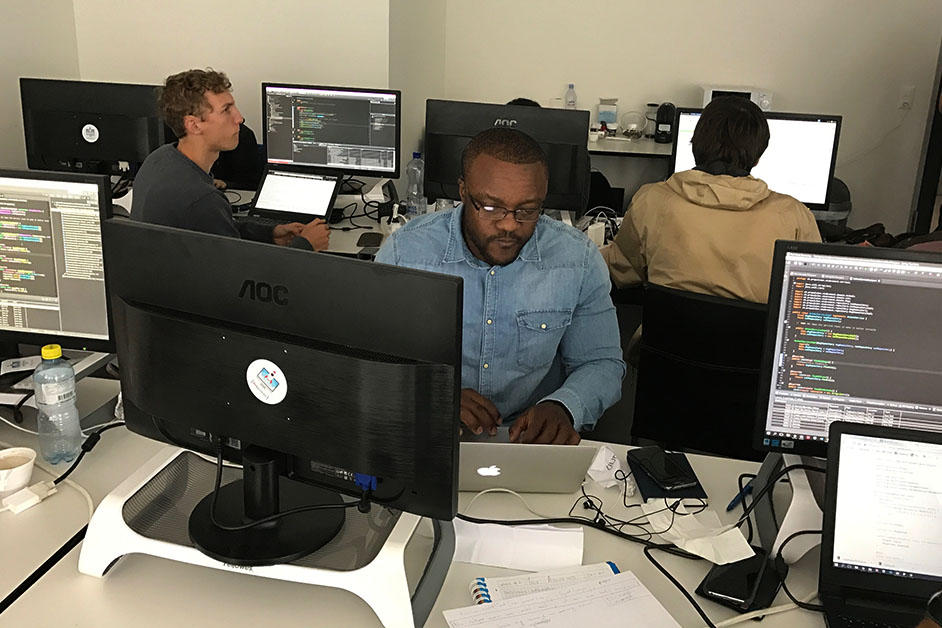
Coding boot camps take off in Switzerland

Coding academies – private, intensive computer programming courses that quickly train participants for the job market – are cropping up in Switzerland. They can be a fast track to in-demand jobs and attract people from all walks of life, from refugees to those looking for a career change.
American Jeremy Savor wanted to learn to code and find a way to live in Switzerland with his Swiss girlfriend. The former mechanical engineer was familiar with so-called coding boot camps in the US, the first of which cropped up in Silicon Valley several years ago to train Facebook employees.
One day, Savor saw an ad for Propulsion Academy, Switzerland’s first-ever such boot camp. He sat for two rounds of interviews, was accepted to the three-month programme, and booked a flight to Switzerland.
Now, every day, he heads to a room in a Zurich office complex where he spends at least eight hours listening to an instructor and practicing writing code in various programming languages, from JavaScript to CSS and HTML5. His classmates all live in the Zurich area, but that’s about all they have in common – some have advanced university degrees, others are in the middle of a career change or trying to find a place in the Swiss job market.
Laurent Meyer, one of the founders of Propulsion Academy, is quick to note the boot camp’s intensity and how important it is that the students can concentrate without interruption. Learning these languages well enough to work in the software development sector – all within three months – isn’t for everyone.
Nor is everyone accepted to the programme. Like Savor, applicants must go through several rounds of interviews to make sure they’re a good fit. A personal interview ensures they’re motivated, while a technical interview allows potential students to demonstrate their critical thinking skills and ability to pick up new concepts and apply them. The 12 students sitting in the classroom today were chosen from a pool of 40 applicants; Meyer says small class sizes are important to guarantee quality instruction.
Labour market integration
Across town in a refurbished garage, another group of students is bent over their computers doing coding exercises. They also came to Switzerland from other countries, but under different circumstances: as refugees.

Ranny Kaddoura came to Switzerland from Syria four years ago. He spent most of that time frustrated that he couldn’t do more with his education and experience managing people at a computer network engineering firm in Damascus, since he wasn’t allowed to work until his asylum request was approved. He heard about the Powercoders offering – a coding academy specifically for refugees – and decided to apply for the sake of getting an internship, which he believes will open doors for him.
Like Kaddoura, most of the refugees in Powercoders now know they will be able to stay in Switzerland, at least for the foreseeable future. That’s important, says instructor Matthias Hüni, because the idea is that they’re able to go on to internships after the three-month programme, and hopefully to a job or further studies after that.
“The long-term goal of this project is integration into the Swiss labour market,” he says.
“We ask companies to open current internship offerings to Powercoders, or ask them if they would be willing to creating an offering especially for a Powercoders intern.”
Most are open to the idea, he says, although smaller companies tend to be the most agile and able to react quickly. Following Powercoders’ first offering in Bern earlier this year, all the graduates either found an internship or went on to study at a university or applied sciences institute.
Hüni says that the founder of Powercoders considered which fields would be ideal for refugees to train in before launching the programme. He points out that retail or similar jobs are difficult because of the language requirements and added challenge of speaking dialect in Switzerland.
“It’s obvious that you have to find something language-independent, and coding is such a field.”
“And where can you have the most impact? That would be the IT industry.”

In-demand field
Back at the Propulsion Academy, many of the students have similar goals to their refugee counterparts: find an internship and work in a growing industry.
A recent studyExternal link on the employment situation in the information and communications technology sector – which includes programmers and software developers – shows a need for workers continuing to outpace predictions in Switzerland. The research from IWSB, the Basel Institute for Economic Research, showed the sector continuing to grow at an above-average rate and concluded that “on the basis of today’s educational scenarios, it is not possible to cover the high demand for skilled workers” in Switzerland.
Lazarus Bohale lost his job in mainframe-based software engineering when many of the positions in the field left Switzerland for other countries with cheaper labour. He took the opportunity to change paths, focusing instead on front-end Web development which he says is more in-demand.

“I saw no future there,” he says of his former position. “Web Tech is big today, something for the future, so why not have a career change?”
Replacing universities?
Bohale considered attending university to shift career paths but ultimately saw Propulsion Academy as a more direct path to his goal.
“The people who go to university and do a bachelor’s degree still have to come out and apply it through apprenticeships and projects,” he says. “We learn and do at the same time.”
But Meyer and the Propulsion Academy co-founder Bogdan Vasile are quick to point out that their programme is meant to complement university study, not replace it.
Several current and former students came to Propulsion Academy after finishing university studies, such as one graduate who finished an MBA at the University of St Gallen but needed coding experience to be able to lead and understand his team at a software company.
“If you are a recent graduate with a Masters or PhD, this could be a chance for you to get practical experience in your domain,” Vasile says.
At Powercoders, student Mohammed Khairi dreams of attending the Federal Technology Institute ETH Zurich, where he recently completed a so-called “discovery semester”. Once he gets his German up to the required level, he plans to formally apply to continue studies he had to interrupt when he left Iraq for Switzerland. But for now, he says, Powercoders is a way to broaden his skill set and get some work experience.

Kaddoura also briefly considered studying at university to expand his career options, but he says that idea went out the window when canton Zurich voters decided in September that people with “F” permits – like him – would no longer be eligible for social aid money.
“I need to find a job as soon as possible,” he says. “It’s a financial consideration.”
The road ahead
Money is a constant consideration for Powercoders as well. They are completely reliant on donor funding since they don’t charge tuition and fund students’ additional costs such as meals and snacks during class time. If funders step up, they hope to take the programme to more Swiss cities in the coming years.
Meyer and Vasile are in a similar position, with their project still very much in the start-up phase. They are seeking investors who see Propulsion Academy as a key contributor to the Swiss technology workforce and start-up scene.
Tonight, the students in both coding academies will head home exhausted, but their instructors say that many will voluntarily keep working long into the night. In the case of the Powercoders, that’s contingent on finding internet access, which can be scarce in refugee accommodations.
“Companies say that if someone was willing to work this hard, it’s a good indicator of the person’s potential,” says Vasile.
Propulsion AcademyExternal link
Founded in 2017, the Zurich-based education start-up offers courses in full-stack Web development and data science in three-month “boot camp”-style modules.
Full tuition for the three-month programme is CHF9,000 ($9,070), although Propulsion Academy strives to offer scholarships and tuition discounts wherever possible according to its founders. Applicants do not necessarily need previous coding or IT experience to be considered for the programme. They are chosen based on an application and two rounds of interviews assessing personal motivation and problem-solving skills.
The coding academy for refugees is also in its second round of classes after a pilot project conducted in Bern. Costs are covered for all participants by donors to the non-profit. The three-month boot camp now underway in Zurich will be followed up by a three-to-six-month internship for participants. Students are also assigned outside volunteer mentors who help them with questions about navigating everyday life in Switzerland.
Depending on the funding situation, Powercoders hopes to expand its offering to other Swiss cities in the near future.

In compliance with the JTI standards
More: SWI swissinfo.ch certified by the Journalism Trust Initiative





























You can find an overview of ongoing debates with our journalists here . Please join us!
If you want to start a conversation about a topic raised in this article or want to report factual errors, email us at english@swissinfo.ch.